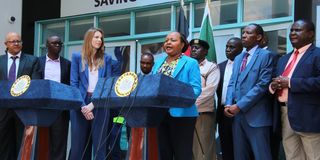Boost for Kirinyaga as UK to fund three key projects

Kirinyaga Governor Anne Waiguru and British High Commission to Kenya Jane Marriot address journalists outside the New Kerugoya County Referral Hospital after touring it on October 19, 2022.
Kirinyaga County will benefit from British government funding to establish three major multimillion-shilling projects meant to spur economic growth and create jobs.
British High Commissioner Jane Marriott said her government, through the Sustainable, Urban Economic Development (SUED) Programme, will fund rice husks and tomato processing, as well as hydropower projects in the region.
"We have discussed specific projects with Governor Anne Waiguru which will be financed through SUED," she said on Wednesday as she toured a Sh1.2 billion medical complex at Kerugoya Referral Hospital that the county is building.
She described Kirinyaga as an amazing region that should continue rising for the benefit of residents and Kenya.
Ms Marriott congratulated Governor Waiguru on her re-election and taking over as the Council of Governors chairperson.
Governor Waiguru thanked the British government for agreeing to support the region in infrastructure development.
"We are very grateful for the support given and we shall continue collaborating with the British government on development," she said.
The projects, she added, will boost the region's economy as the rice husk value chain will create employment and wealth.
She said the rice husks factory will help conserve the environment and the forest cover as the boards made out of the husks will be used to make furniture instead of wood.
She added that there will be a constant supply of raw materials for the husks factory because the county produces 200,000 metric tonnes of husks annually. Kirinyaga is home to the Mwea Irrigation Scheme, which produces 80 percent of rice consumed in Kenya.
The rice husks project will position the county as an industrial hub that will make it attractive to other investors.

The new Kerugoya County Referrral Hospital in Kirinyaga County.
Ms Waiguru said the tomato factory will aid farmers, who produce 60,000 tonnes of tomatoes annually.
"The project, if completed, will help farmers add value to their produce so that they can generate better income to uplift their living standards," she said.
Ms Waiguru explained that the power project will boost industries in the region.
The power will also be supplied cheaply to locals and traders.
"We want to make power available to everyone at an affordable cost," she said.
On Saturday, Ms Waiguru urged President William Ruto to intervene over stalled canals and feeders meant to supply water to expand the Mwea scheme.
Ms Waiguru, who spoke during the commissioning of the Thiba Dam by President Ruto, said farmers on 10,000 acres meant for the expansion of rice farming in Mutithi ward are eagerly waiting for the water.
The canals and feeders, the governor noted, are supposed to take water from the Thiba River – whose steady supply will now be furnished by the Thiba Dam – to farms.
She said the stalled construction is impeding successful implementation of the Sh7.8 billion Thiba Dam project.
“This project is about our people, their work and their families. The aspirations of the rice-growing community will only be fulfilled once water from the dam starts flowing into their farms,” Ms Waiguru said, urging Dr Ruto to intervene and fast-track work on the canals.
Ms Waiguru said that harnessing the Thiba River will ensure adequate supply of water and reduce destructive flooding downstream during rainy seasons.
Adequate and steady supply of water into the rice irrigation scheme is also expected to end conflicts caused by rationing of irrigation water because of scarcity in dry seasons.
For the dam’s host community, Ms Waiguru said the project will support the Rukenya and Kabithe irrigation schemes that benefit about 900 farmers through irrigation of 900 acres of their farms.
She added that the county’s department of Agriculture had introduced 10,000 fingerlings of tilapia and catfish so as to improve the quality of irrigation water and provide an affordable source of protein for the local community.





